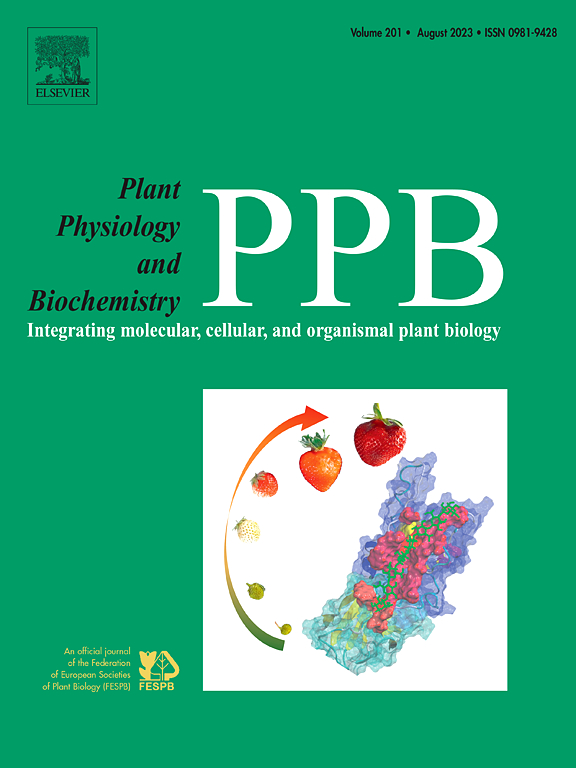转录因子bZIP44通过激活PDR12的表达来增强拟南芥的铅耐受性。
IF 5.7
2区 生物学
Q1 PLANT SCIENCES
引用次数: 0
摘要
铅污染对植物生长和生态系统健康构成严重威胁。虽然植物已经进化出多种解毒机制,但对Pb耐受的转录调控仍知之甚少。在这里,我们证明了转录因子bZIP44在介导拟南芥Pb胁迫反应中起关键作用。Pb胁迫诱导bZIP44的表达。bzip44突变体对Pb胁迫的敏感性增加,Pb积累量增加,而bzip44过表达系对Pb胁迫的耐受性增强,Pb积累量减少。进一步研究发现,bZIP44直接结合铅外泄必需的ABC转运基因PDR12的启动子,激活其在铅胁迫下的表达。遗传分析表明,bZIP44位于PDR12的上游,对拟南芥Pb胁迫响应具有正向调控作用。我们的研究结果确定了bZIP44是PDR12的上游关键调控因子,并建立了bZIP44-PDR12模块作为Pb解毒的核心途径,为植物重金属耐受的分子机制提供了新的见解。本文章由计算机程序翻译,如有差异,请以英文原文为准。
The transcription factor bZIP44 enhances lead tolerance by activating the expression of PDR12 in Arabidopsis
Lead (Pb) contamination poses a severe threat to plant growth and ecosystem health. Although plants have evolved various detoxification mechanisms, the transcriptional regulation underlying Pb tolerance remains poorly understood. Here, we demonstrate that the transcription factor bZIP44 plays a critical role in mediating Pb stress responses in Arabidopsis. Expression of bZIP44 was induced by Pb stress. The bzip44 mutants showed increased sensitivity to Pb stress and enhanced accumulation of Pb, whereas the bZIP44 overexpression lines were tolerant to Pb stress and reduced Pb accumulation. Further studies revealed that bZIP44 directly binds to the promoter of PDR12, an ABC transporter gene essential for Pb efflux, and activates its expression under Pb stress. Genetic analysis showed that bZIP44 is located upstream of PDR12 and positively regulates the Pb stress response in Arabidopsis. Our findings identify bZIP44 as a key upstream regulator of PDR12 and establish the bZIP44–PDR12 module as a central pathway in Pb detoxification, providing new insights into the molecular mechanisms of heavy metal tolerance in plants.
求助全文
通过发布文献求助,成功后即可免费获取论文全文。
去求助
来源期刊
CiteScore
11.10
自引率
3.10%
发文量
410
审稿时长
33 days
期刊介绍:
Plant Physiology and Biochemistry publishes original theoretical, experimental and technical contributions in the various fields of plant physiology (biochemistry, physiology, structure, genetics, plant-microbe interactions, etc.) at diverse levels of integration (molecular, subcellular, cellular, organ, whole plant, environmental). Opinions expressed in the journal are the sole responsibility of the authors and publication does not imply the editors'' agreement.
Manuscripts describing molecular-genetic and/or gene expression data that are not integrated with biochemical analysis and/or actual measurements of plant physiological processes are not suitable for PPB. Also "Omics" studies (transcriptomics, proteomics, metabolomics, etc.) reporting descriptive analysis without an element of functional validation assays, will not be considered. Similarly, applied agronomic or phytochemical studies that generate no new, fundamental insights in plant physiological and/or biochemical processes are not suitable for publication in PPB.
Plant Physiology and Biochemistry publishes several types of articles: Reviews, Papers and Short Papers. Articles for Reviews are either invited by the editor or proposed by the authors for the editor''s prior agreement. Reviews should not exceed 40 typewritten pages and Short Papers no more than approximately 8 typewritten pages. The fundamental character of Plant Physiology and Biochemistry remains that of a journal for original results.

 求助内容:
求助内容: 应助结果提醒方式:
应助结果提醒方式:


